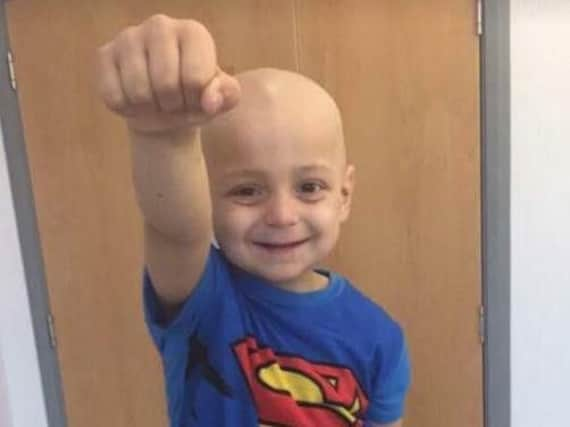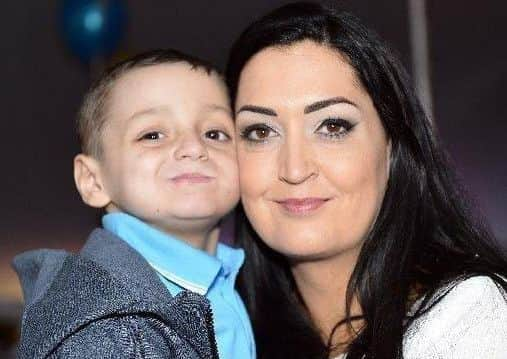Mum of Bradley Lowery urges compromise over 'devastating' children's cancer drug decision


The National Institute for Health and Care Excellence (Nice) has said it would like to recommend dinutuximab beta for inclusion in the Cancer Drugs Fund (CDF) - but it is currently too expensive to do so and there remains ‘substantial uncertainty’ about its long-term benefits.
Charities that support children with high-risk neuroblastoma - a cancer of the nerve tissue - said the decision was ‘immoral’ and families would now have to try to raise thousands of pounds for treatment overseas.


Advertisement
Hide AdAdvertisement
Hide AdGemma Lowery said she hoped a compromise could be reached to make the drug available on the NHS: “Bradley had very aggressive Neuroblastoma, and it took a lot of treatment to clear him of this awful disease,” she said.
“One of the treatments he was given was Dinutuximab Beta. This drug cleared Bradley of the stubborn disease that would not clear with conventional radio or chemo treatments.
“We had 18 very happy months with Bradley after being given the all-clear. This, I believe, would not have happened without the Dinutuximab Beta antibody.
“The same happened with another little girl who is being support by The Bradley Lowery Foundation - she had spots of NB that would not clear, until she accessed the antibody and it gave her the all-clear too.
Advertisement
Hide AdAdvertisement
Hide Ad“We at the Bradley Lowery Foundation have had many discussions regarding the Antibody, and reading the statements from NICE, they have acknowledged that the Dinutuxmab is beneficial in front line treatment for NB but overall, it is not cost effective to the NHS.
“We acknowledge this and we are confident that with meetings between the Pharmaceutical companies, NICE, NB Charities and NHS England, that a more sustainable price can be established.
“As a foundation we see first hand how this drug benefits children who suffer with NB, it is being used in the USA as well as other EU countries. We feel that if an agreement is not reached, we as a country will fall behind the many countries who currently use this antibody for NB front line treatment.
“Our NHS is fantastic and we do understand that the drugs we need to treat these children do come at a high cost, but ethically, should the cost of the treatment for a small portion of the children who are diagnosed every year even come into it?
Advertisement
Hide AdAdvertisement
Hide Ad“We hope the right decision is made. I know first hand how good this drug is, and after speaking with many parents of children who have NB, this will be devastating news if this treatment does not become front-line treatment on the NHS.”
Stephen Richards, chief executive of Solving Kids' Cancer, said: "Anti-GD2 antibody therapy, given at the end of standard therapy, represents the best chance of long-term survival for children diagnosed with high-risk neuroblastoma.
"It is recognised as standard of care by clinicians internationally.
"This is devastating for families - it takes away hope in the fight against high-risk neuroblastoma, and it's immoral to deny children the chance of an essential treatment that could enable them to live longer or cancer-free.
Advertisement
Hide AdAdvertisement
Hide Ad"When we know that there is an effective drug available, it's immensely frustrating for parents to be entangled within a system that leaves them no choice but to raise hundreds of thousands of pounds for their children to receive this treatment overseas.
"Having the extreme pressure of fund-raising, plus the anxiety and logistics of travelling abroad for treatment, puts an enormous emotional and practical strain on families."
Neuroblastoma develops from specialised nerve cells (neuroblasts) left behind from a baby's development in the womb and affects around 100 children each year in the UK, most commonly under the age of five.
In addition to the foundation set up in Bradley's name, Mr Richards was also speaking on behalf of the charities Neuroblastoma UK, the Children's Cancer and Leukaemia group, JACK, Hugs from Henry, Christopher's Smile, Niamh's Next Steps and Smile with Siddy.
Advertisement
Hide AdAdvertisement
Hide AdFootball mascot Bradley, from Blackhall Colliery, died in July last year after being diagnosed with neuroblastoma when he was 18 months old.
The Sunderland fan was a mascot for his beloved club along with Everton and England as he battled the condition.
Nice said it was estimated dinutuximab beta would cost the NHS between £62,300 and £79,900 per quality-adjusted life year gained - higher than what is normally considered to be a cost-effective use of resources, which is between £20,000 and £30,000 per quality-adjusted life year gained.
Mr Richards added: "Nice has been directed to work within an appraisal route that is based entirely on complex health economics.
Advertisement
Hide AdAdvertisement
Hide Ad"This doesn't take into account the nature of the disease and any of the unique contexts, challenges and considerations that exist within rare children's cancers.
"Instead, a drug that saves the lives of some children and extends the lives of others has been appraised against metrics designed to evaluate treatments for chronic conditions affecting adults.
"The system's one-size fits all approach is simply not fit for purpose.
"We owe it to these vulnerable children to give them the best chance of survival, and we will do everything in our power to keep fighting for these families."
Advertisement
Hide AdAdvertisement
Hide AdHe said the decision left the UK lagging behind the United States and other European countries.
Meindert Boysen, director of the Nice Centre for Health Technology Evaluation, said: "Dinutuximab beta shows a lot of promise, but the evidence is uncertain and we must acknowledge this.
"There is opportunity for the company to collect longer-term data from the ongoing trials. This could make dinutuximab beta a candidate for inclusion in the Cancer Drugs Fund.
"However, the company needs to demonstrate that the drug has at least the potential to be cost-effective before we can consider recommending dinutuximab beta be included in the CDF.
"As such, we are keen to work with the company and NHS England to help them explore options."